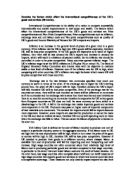Examine the factors which affect the international competitiveness of the UK's goods and services (40 marks). International Competitiveness is the ability of a nation to compete successfully
Examine the factors which affect the international competitiveness of the UK’s goods and services (40 marks).
International Competitiveness is the ability of a nation to compete successfully internationally and sustain improvements in real output and wealth. The factors which affect the interantional competitiveness of the UK’s goods and services are Price competitiveness and Non-Price Competitiveness; Price competitiveness such as inflation, exchange rates and unit labour costs and Non price competitiveness such as quality of UK’s goods and Income Elasticity of Demand for UK’s exports and imports.
Inflation is an increase in the general level of prices of a given kind in a given . If the inflation rate for UK is high then UK’s goods will be expensive, therefore UK will be less price competitive. If the UK goods are expensive as a result of higher inflation, then there will be less demand for UK’s exports and increase in demand for Imports, which will result in a balance of payment deficit. So the inflation rate should be controlled in order to be price competitive. Many countries operate inflation target. The UK’s inflation target is set for RPIX inflation at 2.5% plus 1% or minus 1%. The Bank of England Monetary Policy Committee sets interest rates with the objective to maintain stable or low level of inflation. However even if the inflation rate for UK is high, when comparing with other countries, UK’s inflation rate might be lower which means UK will be price competitive with those countries.

This is a preview of the whole essay
Peer Reviews
Here's what a star student thought of this essay
Quality of writing
The structure in this essay is strong. There is a clear introduction which defines the key terms which are to be explained, and the conclusion poses a judgement on the significance of factors. It was a shame to see a few spelling mistakes, and there are times where words are capitalised when they needn't be. For example "goods and services are Price competitiveness and Non-Price Competitiveness" - these aren't proper nouns and so don't need capital letters. A simple proof read should remove any of the spelling mistakes.
Level of analysis
The analysis in this essay is sound, and I like the progression in each paragraph. Each paragraph starts with a clear signpost stating why it is relevant to international competitiveness, and then goes onto define any terms if necessary. Being able to do this concisely is a good skill, and this essay does this well. There is then a clear analysis of why this factor affects international competitiveness. I would've liked to have seen a diagram somewhere in this essay, as it's an easy way to gain marks. Showing a shift in the demand and supply for pounds, possibly, changing the exchange rate would've sufficed if an explanation was given. It was good to see that the essay mentioned inflation rates only affect competitiveness if they are relatively higher than other economies. Being able to show this awareness will gain credit! I would've liked to have seen some trends discussed which were particular to the UK, as this shows the ability to apply knowledge. When talking about the quality of products, the essay could've gone much further in discussing structural issues in the UK economy. If I were doing this essay, I would've looked at comparative advantages and how the UK's has changed in recent years, affecting international competitiveness.
Response to question
This essay engages well with the question. There is a breadth of factors discussed here, and it's good to see such a wide knowledge. It was good to see a sustained awareness of the difference between price and non-price factors, as in my experience many people simply look at price being the strongest element. You cannot underestimate quality of products, and this essay does well in including this! This question doesn't explicitly ask for the extent to which each factor affects competitiveness, but this would've added to the conclusion.






![Discuss whether inflation is necessarily harmful [12 marks] (27 minutes)](https://mbt-essays-prod-public.s3.eu-west-1.amazonaws.com/1216945/listing/1216945_1.jpg)

